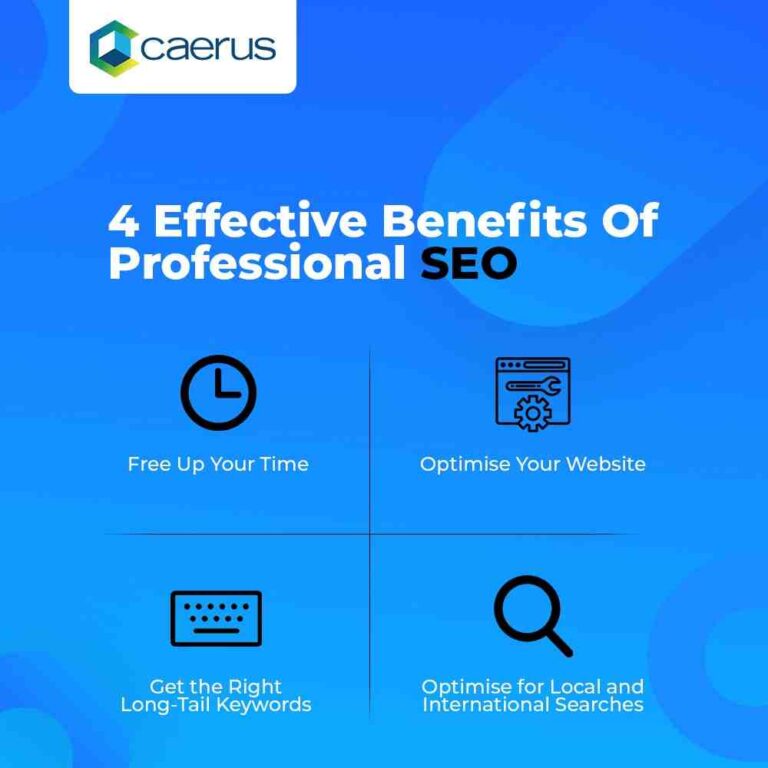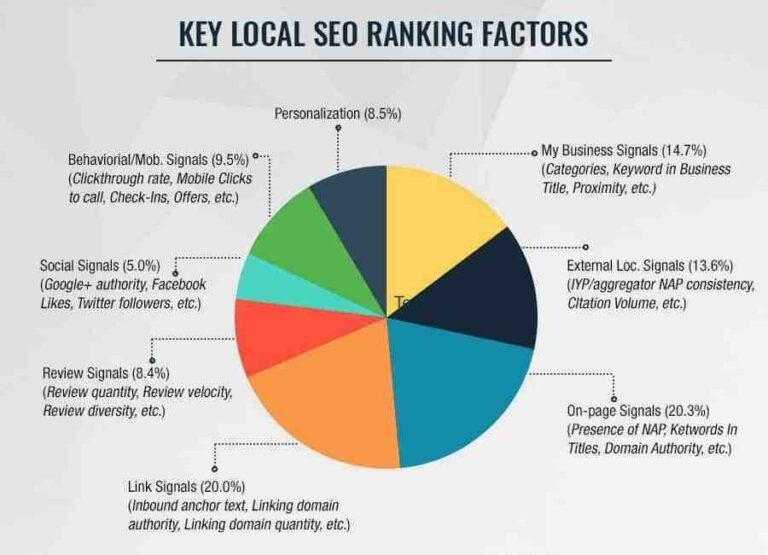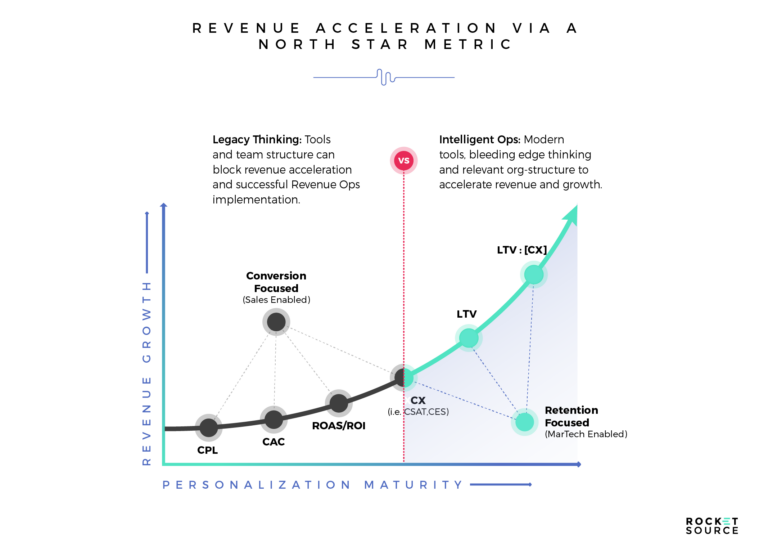Local SEO for Law Firms: Get More Local Clients
Law is a competitive industry, especially when it comes to SEO. But if you just focus on the big keywords in the search for traffic, you can waste a lot of effort.
A location binds most searches for legal issues or services. You want to appear in the most relevant results, targeted at local searchers.
So to rank higher in Google and other top search engines, you should focus on local search engine optimization (SEO).
Google’s local package has become more competitive and shows fewer results. While local SEO and organic SEO are different strategies, approach your organic SEO with a local mindset.
This article will show you how to optimize your law firm website and business listings to rank better for local SEO.
What Is Local SEO For Law Firms?
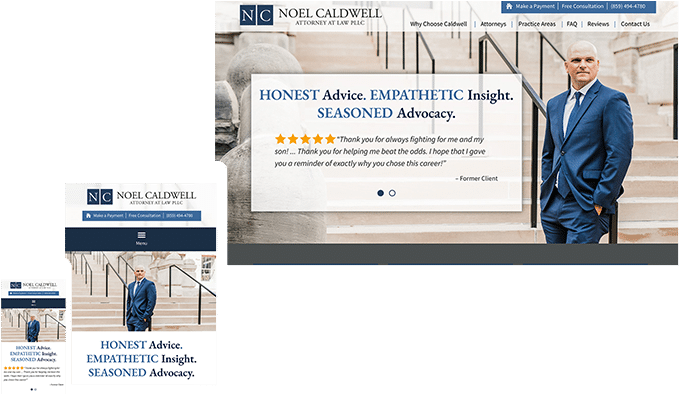
Local SEO is a type of search engine optimization that targets local SERP features like Local Pack. These features appear at the top of the page, often next to a map, when Google determines that a search query has a location-based intent.
Organic search focuses on the results under ads and SERP features. But to help with your local SEO efforts, it’s also important to bring a local mindset to your organic results.
If someone is looking for a service in their local area or using localized search terms like [best lawyer in New York], they will likely see results from Local Pack.
Screenshot from Google search for [best lawyer in new york], August 2022
In the case of lawyers, they are also likely to see ads with “Google Screened” results for nearby providers.
Google-screened results are ads for service providers that have been further screened by Google. The verticals that use this feature include childcare, finance, health and legal. You’ll notice that Google Screened results focus on nearby businesses and display some of the features of the Local Pack, such as reviews and hours of operation. They are also at the very top of the page. If you want that coveted spot, get screened and develop a local advertising strategy.
Local SEO is essential for law firms because most law firms serve clients in a specific geographic area. Unless you service clients nationally, you will likely only have leads from people in your county, city, or state.
Additionally, trying to rank for localized keywords is less competitive than for broad keywords.
Fewer people might be looking for a [criminal attorney in Dallas]. Yet there will also be fewer law firms trying to rank for that period compared to the [best criminal lawyer] period.
Key Components Of Local SEO For Law Firms
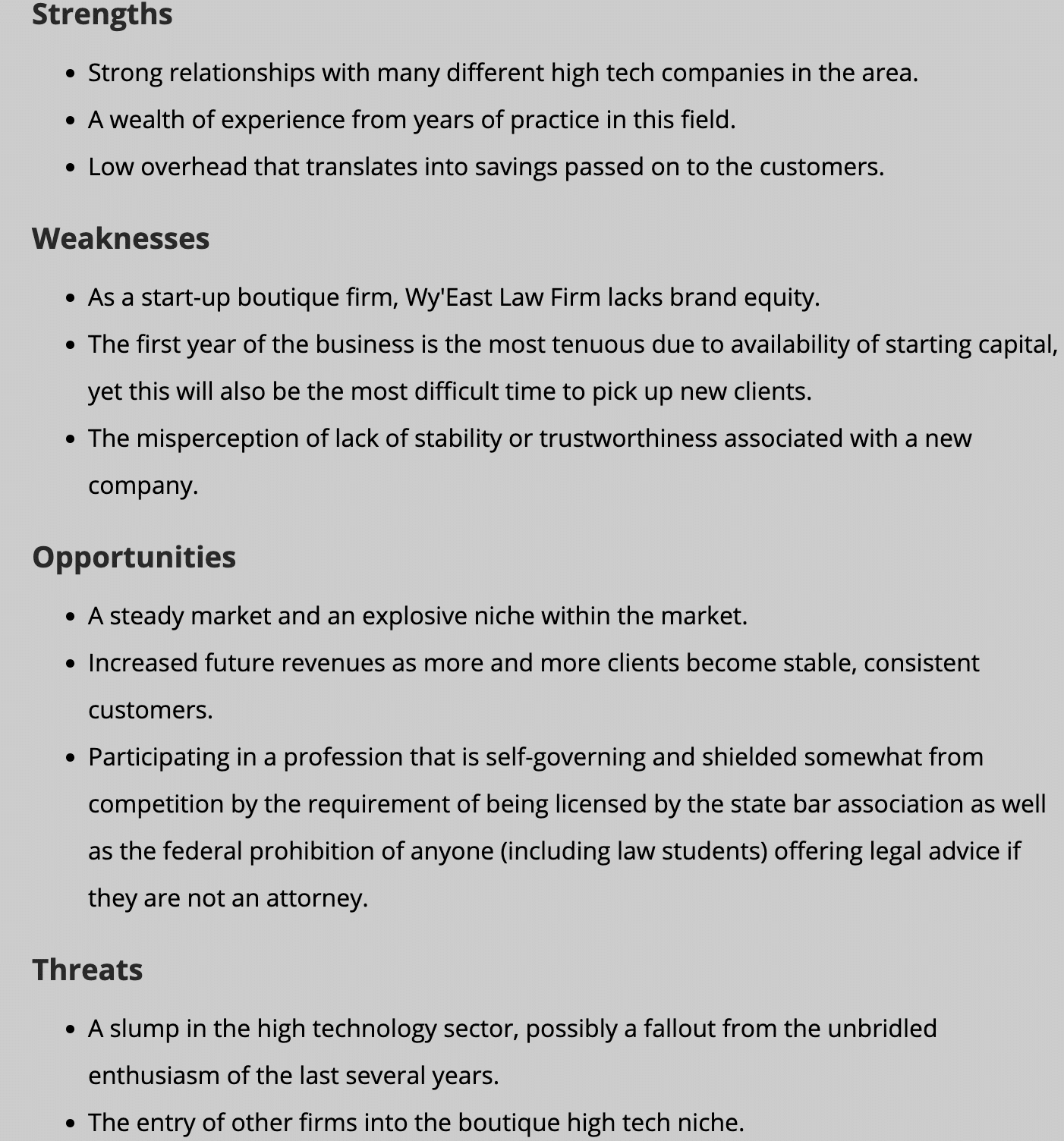
If you’re ready to invest in one of the most effective marketing methods for law firms, it’s time to get into local SEO.
Below, we’ve outlined the main components of local SEO for law firms and how to implement them on your website so you can start attracting more local clients.
Website Optimization
The first component of local SEO for law firms is website optimization, as you need a fast, functional and SEO-friendly website to attract organic traffic.
If you already have a website, this means you follow on-page and technical SEO best practices to fix any issues on-site.
This can include repairing broken links, optimizing your site’s loading speed, using your target keywords through page titles and content, and designing a user-friendly site structure.
If you’re building a new website, make sure your web developer understands SEO and can design a website that’s optimized for search engines and people.
If your site loads quickly, is easy to navigate and can be indexed by search engines, you have a better chance of ranking in the local search results.
Mobile Experience
51% of website visits in the US come from mobile devices. This means that people use smartphones and tablets to search for goods and services and then browse websites on the go.
As a website owner, you want a mobile-friendly website so that potential customers can navigate your site even on a small screen.
To do this, you should create a mobile-friendly version of your website with clear text, fast-loading images and clear call-to-action buttons.
Focusing on mobile experience is important not only because mobile friendliness is an important ranking factor, but also because it will keep visitors on your site for longer.
Content Creation
Your website content tells visitors what you do, how you can help them, and how they can get in touch with you.
It also works to attract organic visitors when you use localized keywords in the titles, meta descriptions and body text of your web pages.
When conducting keyword research for your law firm’s content strategy, use keyword research tools like Semrush, Google Search Console, or Soovle. They can help you find relevant terms for the area you serve and your services and inspire the content you should create.
If you e.g. provide criminal law services in Los Angeles, you might want to target keywords like [Los Angeles Criminal Lawyer] or [Los Angeles Criminal Lawyers].
You may then use these Terms on a “Criminal Law” service page or the home page of your website.
In addition to that, you can publish informative articles that attract potential customers.
With blog posts like “What the new DUI laws mean for Los Angeles residents” or “What should I do if I’m arrested in Los Angeles?” you can work to attract potential customers to your company.
This is where a local SEO strategy shines in organic results. People searching for information probably don’t want Local Pack results so they can scroll to the articles. You still want to let them know that your answers are relevant to their location when they do.
Once you’ve found the keywords you want to target, you should write informative content that speaks to your customer’s interests. Then of course you need to use your target and related keywords throughout the page to rank for those terms in local search.
But remember not to overload your content with keywords. So much so that it takes away from the intent of your content.
Google Business Profile
How can I get my law firm to rank higher on Google Maps or local map apps?
Law firms often struggle to rank well on Google Maps because they lack a strong presence in their city’s area code.
Unfortunately, this means fewer customers will see them and they won’t appear in search results.
And you may already be aware that Google’s Local Pack algorithm affects your local SEO rankings. The Local Pack algorithm provides consumers with high-quality information from nearby locations. As a result, you may see fewer local listings in organic search results.
To gain visibility on search engine results pages (SERPs) and Google Maps, start by taking advantage of your Google Business Profile (GBP). A GBP helps businesses connect with customers across all devices, whether you want to reach new audiences or improve conversions.
Getting started with Google Business Profile is free and there are several fields where you can include your hours, services, address, phone number, website URL and more.
Start by adding photos and details about your practice, then add information about your staff and services. Finally, let Google know where your office is located.
Once you’re done, check back often to make sure your listing remains accurate. A GBP is essentially an online directory and one-stop shop for potential customers, so it’s crucial to update it consistently.
A GBP also allows you to accumulate reviews from previous clients, increasing your law firm’s reputation and local rankings.
Reputation & Reviews
Positive client reviews can do wonders to increase your law firm’s authority, online reputation, and search engine rankings.
If potential clients are searching for a lawyer and see that your firm has the most positive reviews, they may be inclined to choose you over the competition.
You can ask customers to write reviews on your Google Business Profile, Facebook and other directory listings.
Having a number of positive reviews can set your law firm apart while also indicating to Google that your law firm is legitimate.
When it comes to reviews and online reputation management, having a strategy to monitor and respond to online reviews promptly is critical.
Online reviews are important to consumers and are a significant indicator of whether they will choose your business.
A recent survey shows that 53% of consumers expect a business to respond to a negative review within seven days. But don’t leave out positive reviews. It is important to respond to them as well.
If consumers see that your business is responding to reviews, it can show that you provide good customer service and that your customer’s impression of your business matters to you.
Link Building & Citations
The final component of local SEO for law firms is link building, which involves attracting links from other sites back to your site.
Since a link from another website (a “backlink”) is essentially a statement of confidence from that website that your law firm is reputable and a good source of information. So attracting a variety of high quality links can improve your local rankings.
The key here is to attract links from reputable, industry-related websites. One way to do this is by submitting your business information to directories.
Or you can submit guest posts to websites and landing interviews in industry publications, creating high-value content that naturally attracts links.
Additionally, marketing your content, e-books and PDFs to external blogs can be a beneficial strategy.
This is only the tip of the iceberg in terms of link building, but it is worth trying different strategies instead of buying cheap links.
Remember, focus on quality over quantity. The best links help you boost your local rankings and generate more referral traffic.
Your Law Firm Needs Local SEO
If you haven’t already, now would be a good time to optimize your website and listings for local search. This will give potential clients a better idea of where you practice law and allow you to attract new clients from the community you serve.
Local SEO has become increasingly important for law firms looking to expand their practice.
Therefore, it only makes sense that businesses should take advantage of the same tools that other businesses use to build their online presence and authority.
Optimizing your website presence will increase traffic from local searches and help your business rank higher on SERPs.
Featured Image: Paulo Bobita/Search Engine Journal
How many people use Google for local business?
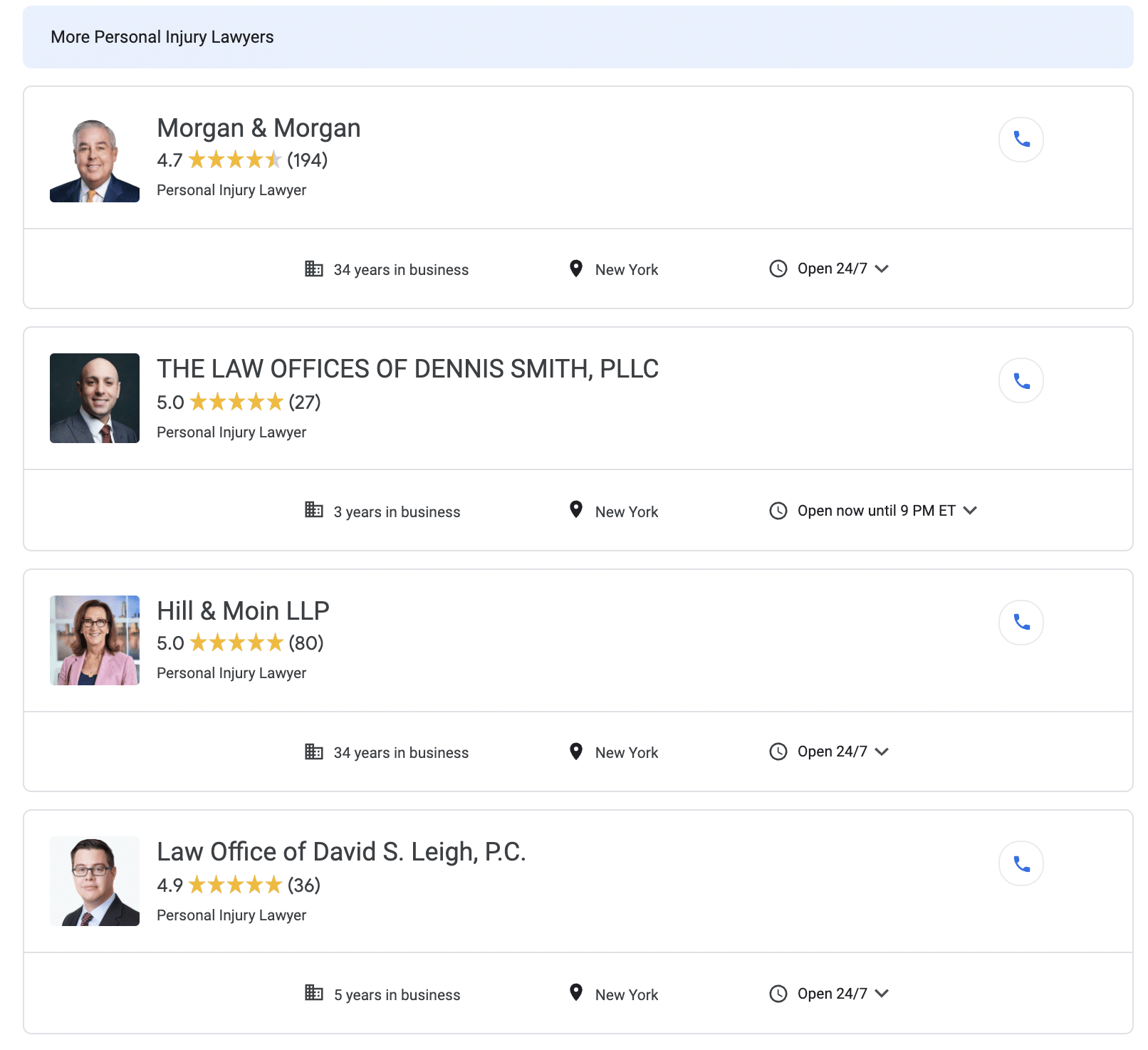
86% of customers use Google Maps to find local businesses. The latest local SEO statistics from Google Maps reveal that 86% of users use the platform to search for local shops and businesses.
How many people search online for local businesses? What percentage of searches are local? In 2020, 93% of consumers used online searches to find a local business (according to a BrightLocal survey of 1,013 US-based consumers).
How many people use Google Maps for business?
In fact, a new consumer survey from Brandify found that 77% of respondents use Google Maps to find “near me” business information far before other sites.
Do businesses use Google Maps?
More and more people are using Google Maps to discover new places to visit. This makes it a great tool for businesses looking to increase the number of visitors to their physical location or increase their brand awareness in the local area. Start reaping the benefits of adding your business to Google Maps with these three easy steps.
What percentage of people use Google my business?
90% of the world’s population only clicks on links that lead to the first page. 64% of consumers have used GMB to find contact information for a local business. Hotels mark the highest number of views on Google Search and Maps each month. 70% of clicks in Google search results go to organic, while 30% go to AdWords.
How many people use Google Maps percentage?
Nearly 70% of smartphone owners use Google Maps the most, compared to 12% who use the second most popular app, Google-owned Waze. Overall, 77% of smartphone owners say they regularly use navigation apps.
What percent of searches have local intent?
Did you know that 88% of consumers who conduct a local search on their smartphone visit or call a store within a day? In fact, nearly 46% of all Google searches are for local information.
What percent of Google searches are local?
Almost half (46%) of all Google searches consist of users looking for local information. These local searches consist of people searching for businesses in their local area or within a specific service area.
How many local searches are there?
60% of Americans use smartphones and tablets to search for local products. There are approximately 81.1 billion local search queries from mobile phones annually, based on local SEO statistics. Most people use mobile to search for products and gather more information before making a purchase.
What percentage of people use Google my business?
90% of the world’s population only clicks on links that lead to the first page. 64% of consumers have used GMB to find contact information for a local business. Hotels mark the highest number of views on Google Search and Maps each month. 70% of clicks in Google search results go to organic, while 30% go to AdWords.
How popular is Google My Business?
In a recent study, we found that 64% of consumers have used Google My Business listings to find a local business address or phone number.
Is Google My Business worth it?
Whether you are a local, regional, national or international business, the simple answer is YES. Local search is an integral element of a comprehensive digital marketing campaign, and Google My Business is a huge and ever-growing factor.
How many business are listed on Google My Business?
If your profiles were created before October 2017: You can own a maximum of 100 business profiles, including Google brand pages and YouTube channels. If your profiles were created in October 2017 or later: You can own any number of business profiles.
Who is the most successful lawyer in the world?

1. Charlie Munger. While Charlie Munger is known as Warren Buffet’s partner at Berkshire Hathaway, he is also a Harvard-educated lawyer. Munger flourished in law school, graduating magna cum laude with a JD in 1948 before joining the California law firm Wright & Garrett.
What type of lawyers make millions? What Types of Lawyers Pay the Most for Lawyers?
- Company law. Lawyers working for corporations can earn millions of dollars as general counsel. …
- Criminal law. …
- Personal injury. …
- Bankruptcy Act. …
- Family law.
Are most lawyers successful?
What percentage of lawyers are successful? According to the American Bar Association, about 36% of all lawyers say they are very successful, and about half indicate they are successful. Only 4% of lawyers surveyed in the survey said they were not successful.
Who is the world’s most successful lawyer?
Sir Lionel Luckhoo (b. 2 March 1914), senior partner of Luckhoo and Luckhoo of Georgetown, Guyana, succeeded in obtaining 245 consecutive acquittals of murder charges between 1940 and 1985.
What are the odds of becoming a lawyer?
less than a 1 in 3,800 chance of becoming a dentist, a 1 in 891 chance of becoming a doctor, and a 1 in 356 chance of becoming a lawyer. a 1 in 35 chance of becoming a teacher. a 1 in 9 chance of graduating from college. a 1 in 5 chance of dropping out of school before high school.
What percent of lawyers become successful?
According to the American Bar Association, about 36% of all lawyers say they are very successful, and about half indicate they are successful.
Who is the world’s richest lawyer?
Joe Jamail His most famous case came in 1985 when he successfully represented Pennzoil against Texaco in a lawsuit for which he earned $335 million. Some of the best lawyers have been able to amass incredible wealth over the course of their careers.
Who is the most successful trial lawyer?
Gerry Spence is widely regarded as one of the most successful trial and criminal lawyers in America. He has never once lost a criminal case – either as prosecutor or defense lawyer – and he has not lost a civil case since 1969.
Who benefits from local SEO & Why?
With local SEO, your business gets more visibility by being found by the right people who are interested in your product and at the right time. When your business is more visible, it means more profits, sales and even relevance.
What benefits the most from using SEO? SEO increases organic discovery and quality website traffic. Organic visibility leading to increased website traffic is a monumental benefit of SEO. Search engine optimization is hyper-targeted and customer-centric.
Who benefits from local SEO and why?
One of the benefits of local SEO is that it drives potential customers to your website and improves conversion rates. According to Joel House Search Media, 28% of local searches result in sales. So there is no denying that local SEO results in better conversion rate – increased traffic flow results in increased sales.
What is local SEO and what are the benefits of local SEO?
Local SEO is a search engine optimization (SEO) strategy that helps your business become more visible in local search results on Google. Any business that has a physical location or serves a geographic area can benefit from local SEO.
Why is local SEO important?
Local SEO allows you to put important information about your website online, such as the address and phone number of your business. Additionally, you can highlight and promote the type of products or services you offer on your website using SEO techniques.
Who benefits from local SEO?
The most obvious benefit of search engine optimization in general is the ability to increase your rankings in Google search and other search engines. All businesses – local or otherwise – crave the first spot because then they have the best chance of attracting new visitors to the site.
What is SEO who benefits from it how?
SEO stands for search engine optimization, which is the process of improving your website to increase organic visibility for specific search queries. The goal of SEO is to improve the quality and quantity of traffic to your website through on-site changes.
What are the benefits of local SEO services?
Benefits of Local SEO Better Online Visibility: Local SEO activity, such as citation and link building, increases your online visibility. This makes your business easier to find for new customers. More in-store foot traffic: Greater local visibility brings more foot traffic to your brick-and-mortar location.
What is the benefit of local SEO?
Local SEO helps increase online visibility so you get noticed by new customers. Google Maps and Google My Business optimization can generate more direct calls, leads and sales. Optimizing your site for localized terms means you attract targeted traffic and better leads.
What is local SEO and why it is important for SEO?
Simply put, local SEO is where you focus on improving your rankings and visibility in local search results such as Google’s Map Pack/Local Pack. Organic SEO is how you improve web pages in organic search. How your site ranks in these organic results can also have a positive impact on your Local Pack ranking.
How much should I pay local SEO?
Typical local SEO campaigns cost between $300 and $2,000 per month depending on your company’s needs, your competitors and your geographical location.
Is it worth paying for local SEO optimization? SEO is worthwhile if you have the right strategy in place and work with a partner who knows how to get results. About 93% of online experiences begin with a search engine, and the closing rate for SEO leads is much higher than for traditional marketing. So SEO provides an impressive return on investment (ROI).
How much does local SEO cost per month?
In 2021, SEO costs for local campaigns averaged around $1,000 per month, while nationally focused SEO campaign costs ranged between $2,500 – $.7500 per month on average. The cost of SEO services varies depending on the complexity of the keywords and the services included.
How much does SEO cost per month for small business?
According to a survey of 1,200 business owners and over 350 agencies, freelancers and consultants, the average price for Small Business SEO is $501-$1,000 per month globally. The average cost of small business SEO in the US is $2,501 to $5,000 per month.
How much should I pay for SEO per month?
How much can you expect to spend on SEO? If you hire a top-tier SEO company to run a local campaign, expect to pay $500.00 per month. A national or international campaign will require a minimum budget of $2,500 to $5,000 per month. Some companies offer a “trial package” at a lower price without a contract.
How much does it cost for local SEO?
How much does local SEO cost on average? For a one-time project focused on analysis, research, cleanup and optimization, the average price for a local SEO project will range from $300 – $1500 with an average price around $750.
How much do freelancers charge for SEO?
Hiring an experienced SEO freelancer or agency on an hourly basis typically costs somewhere between $50-$150 an hour. Of course, you can find people who charge significantly less or more than this hourly rate. For example, this hourly rate breakdown for SEO showed that 6% of SEO providers charge over $200/hour.
Is SEO good for freelancing?
A freelance SEO career can also be a fulfilling experience in terms of work contribution and finances. That’s why it’s a great way to take charge of your career in your own hands and be a professional success that works on your own terms.
How much do SEO freelancers make 2022?
How much does an SEO Freelancer earn? Per As of August 29, 2022, the average annual salary for an SEO Freelancer in the United States is $62,760 per year. Just in case you need a simple salary calculator, that’s about $30.17 an hour. This equates to $1,206/week or $5,230/month.
How much should I charge for SEO?
| Type | Cost |
|---|---|
| Cheap SEO | $500 to $3,000 a month |
| SEO in the middle class | $3,000 to $15,000 per month |
| Advanced SEO | $15,000-$30,000 per month |
| Enterprise SEO | $30,000-1 million per month |
How much should a small business pay for SEO?
How Much Does Small Business SEO Cost? The average price for small business SEO is $750 to $2000 per month or $5000 to $30,000 for one-time projects. Smaller businesses that invest in SEO consulting services can expect to pay $80 to $200 an hour.
How much should I pay someone for SEO?
If you hire a top-tier SEO company to run a local campaign, expect to pay $500.00 per month. A national or international campaign will require a minimum budget of $2,500 to $5,000 per month. Some companies offer a “trial package” at a lower price without a contract.
Is it worth it to pay for SEO?
The short answer is that SEO is very effective – not only for generating traffic, but also leads and sales. Do not worry. The long answer includes research and data, not just empty statements. Most SEOs get too caught up in search-specific metrics like SERPs (search engine results page), rankings, and organic traffic.
Is SEO worth it for small businesses?
Even if you choose to invest money in SEO, the ROI can more than double if the marketing campaign is well organized. So the simple answer is ‘yes’, SEO is worth it for any small business, even those that don’t operate online.
How much should I charge for local SEO services?
How much does local SEO cost on average? For a one-time project focused on analysis, research, cleanup and optimization, the average price for a local SEO project will range from $300 – $1500 with an average price around $750.

